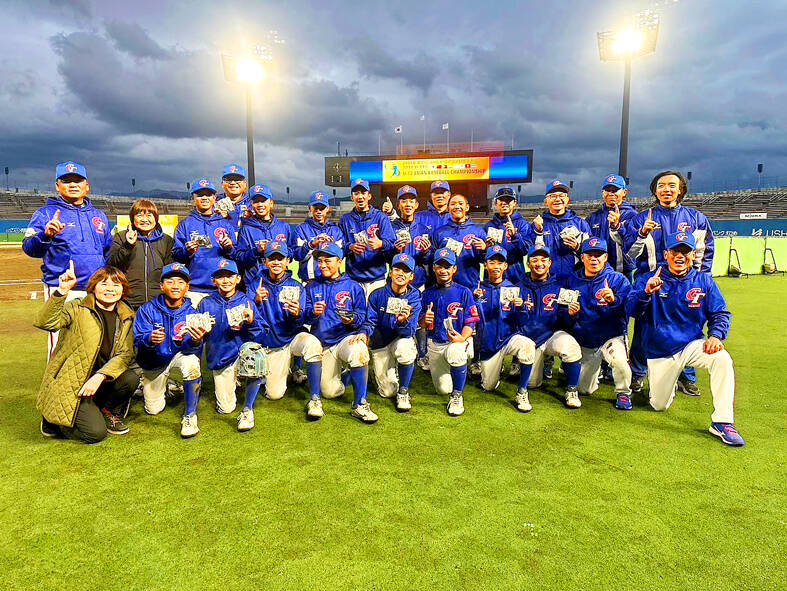Team Taiwan yesterday won a second consecutive title at the U-12 Asian Baseball Championship in Matsuyama, Japan — the team’s eighth championship in total — after defeating South Korea 5-1 in the final.
Taiwan secured two wins and one loss to finish second in division B, losing only to South Korea 0-1.
On Wednesday, the team thrashed China 16-0 and on Thursday edged Japan 1-0 to reach the final yesterday.

Photo courtesy of the CTBA
After a delay of one hour due to rain, Taiwan’s Su Yu-hsiang (蘇宇翔) was sent to first base, before successfully stealing second base after the South Korea pitcher’s wild pitch.
A bunt from Lin Wei-yen (林瑋諺) brought Su back across the home plate, marking the first run for Taiwan.
Lin stole his way to third base and was brought home with a hit by Sung Yi-le (松以勒), while Sung stole his way to second base after a wild pitch, then crossed home plate when Chou Chen-chuan (周震泉) knocked out a two-base hit.

Photo courtesy of the CTBA
South Korea then changed their pitcher to turn the tide, but Taiwan’s Yang Nian-hsien’s (楊念先) hit and a subsequent base steal caused the catcher to fumble, resulting in Chou bringing home the fourth run.
Yang Po-hsun (楊伯勛) then brought Yang Nian-hsien home with another two-base hit.
Taiwan pitcher Huang Li-huan (黃立桓) initially felt stress in the bottom half of the first inning, but pitched the six innings, sending down 77 pitches and giving up only four hits.
Taiwan in 2012 missed the chance to maintain their six-championship winning streak when they came second, but they have now won gold in three out of the four championships since 2014.
Taiwan have qualified for next year’s World Baseball Softball Conference U-12 Baseball World Cup to be held in Tainan.
Separately yesterday, Japan crushed China 10-0 in the match-up for the bronze medal.
All three Japan pitchers used ensured that no China player made a hit throughout the six-inning game.
Additional reporting by CNA

LONG FLIGHT: The jets would be flown by US pilots, with Taiwanese copilots in the two-seat F-16D variant to help familiarize them with the aircraft, the source said The US is expected to fly 10 Lockheed Martin F-16C/D Block 70/72 jets to Taiwan over the coming months to fulfill a long-awaited order of 66 aircraft, a defense official said yesterday. Word that the first batch of the jets would be delivered soon was welcome news to Taiwan, which has become concerned about delays in the delivery of US arms amid rising military tensions with China. Speaking on condition of anonymity, the official said the initial tranche of the nation’s F-16s are rolling off assembly lines in the US and would be flown under their own power to Taiwan by way

OBJECTS AT SEA: Satellites with synthetic-aperture radar could aid in the detection of small Chinese boats attempting to illegally enter Taiwan, the space agency head said Taiwan aims to send the nation’s first low Earth orbit (LEO) satellite into space in 2027, while the first Formosat-8 and Formosat-9 spacecraft are to be launched in October and 2028 respectively, the National Science and Technology Council said yesterday. The council laid out its space development plan in a report reviewed by members of the legislature’s Education and Culture Committee. Six LEO satellites would be produced in the initial phase, with the first one, the B5G-1A, scheduled to be launched in 2027, the council said in the report. Regarding the second satellite, the B5G-1B, the government plans to work with private contractors

‘NARWHAL’: The indigenous submarine completed its harbor acceptance test recently and is now under heavy guard as it undergoes tests in open waters, a source said The Hai Kun (海鯤), the nation’s first indigenous defense submarine, yesterday began sea trials, sailing out of the Port of Kaohsiung, a military source said. Also known as the “Narwhal,” the vessel departed from CSBC Corp, Taiwan’s (台灣國際造船) shipyard at about 8am, where it had been docked. More than 10 technicians and military personnel were on deck, with several others standing atop the sail. After recently completing its harbor acceptance test, the vessel has started a series of sea-based trials, including tests of its propulsion and navigational systems, while partially surfaced, the source said. The Hai Kun underwent tests in the port from

MISSION: The Indo-Pacific region is ‘the priority theater,’ where the task of deterrence extends across the entire region, including Taiwan, the US Pacific Fleet commander said The US Navy’s “mission of deterrence” in the Indo-Pacific theater applies to Taiwan, Pacific Fleet Commander Admiral Stephen Koehler told the South China Sea Conference on Tuesday. The conference, organized by the Center for Strategic and International Studies (CSIS), is an international platform for senior officials and experts from countries with security interests in the region. “The Pacific Fleet’s mission is to deter aggression across the Western Pacific, together with our allies and partners, and to prevail in combat if necessary, Koehler said in the event’s keynote speech. “That mission of deterrence applies regionwide — including the South China Sea and Taiwan,” he